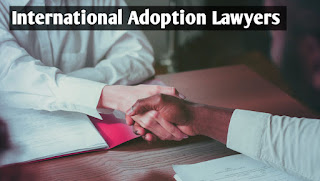International Adoption Lawyers & Adoption Solicitors
Adoption is a life-changing and rewarding journey that brings families together. Adopting children offers an incredible opportunity to expand your family and provide a nurturing home for those in need. Nonetheless, the adoption journey entails a rigorous process and various legal considerations that may arise. It is crucial to seek appropriate legal guidance and support to navigate these matters effectively.
In the United Kingdom, adoption lawyers play a crucial role in assisting prospective parents throughout the legal aspects of adoption.
In this article, we will explore the significance of adoption lawyers in the UK and how they can guide individuals or couples on their path to parenthood.
The process typically involves assessments, background checks, and court proceedings, ensuring that the child's welfare remains the primary focus.
Specialist adoption lawyers
Our team of specialized adoption lawyers possesses a wealth of knowledge in adoption law. We have successfully assisted numerous families in navigating various aspects, including adoption applications, assessments, parental rights, birth parent's rights, and alternative options to adoption.
Recognizing the substantial hurdles and challenges faced by prospective adoptive parents, we are committed to providing comprehensive support and ensuring a seamless journey at every stage. With our expertise, you can expect clear guidance on your legal standing, a thorough understanding of the process ahead, and full awareness of the available options throughout the entire journey.
What is Adoption?
When a child is adopted, their legal situation changes. They stop being considered the child of their birth parents, and they become the legal child of their adoptive parent(s). Consequently, the child no longer possesses automatic entitlement to inherit assets or funds from their birth family. However, they gain the same inheritance rights as any biological child would from their adoptive parents.
The birth family's privileges, including access to information about the child and decision-making authority, are terminated and effectively transferred to the adoptive family. In certain cases, adopted children may maintain limited contact with their birth family through the exchange of letters on an annual or semi-annual basis.
Domestic Child Adoption
To guarantee that only qualified individuals or couples are given the chance to become parents, the government closely regulates the adoption procedure inside the nation. This is crucial because every child deserves responsible and caring parents in a stable home environment.
Adoption is a significant and important decision. A child who has been adopted officially leaves their birth family and is now regarded as a member of your family.
While an adoption agency will provide guidance throughout the process, it is advisable to seek legal advice from our specialized family lawyers before initiating the adoption journey.
International Child Adoption
The process of adopting a child from another nation who either has no parents or is growing up in a children's home entails international adoption. It can also include adopting a relative's child if you or your partner were born outside the UK.
This area of law is intricate and requires specialized knowledge. International adoptions are closely examined by both the authorities in the child's country of origin and UK authorities to make sure the adoptive parents can maintain the child financially and emotionally. The Adoption and Children Act of 2002, the Adoption Order of 1973, and the 1993 Hague Convention all govern how overseas adoptions are recognized in the UK.
Seeking expert legal advice is essential to navigate the legal aspects of international adoption and ensure a smooth process.
Our services include:
- Providing guidance to families considering international adoption and bringing a child back to the UK.
- Advising on the responsibilities and actions of local authorities or adoption agencies regarding international adoptions, including the assessment process.
- Representing adopters in adoption proceedings within the UK when the foreign adoption is not recognized, necessitates readoption.
- Advising and representing prospective adopters who intend to take a child out of the UK for adoption in another country, whether the child is in local authority care or as part of a private family arrangement.
- Advising relatives of a child abroad who may have been abandoned, orphaned, or offered for adoption in the UK. These cases are complex due to additional immigration considerations.
- Advising and representing step-parents who have married a foreign national with a child from a previous relationship, seeking to grant the child full membership in the new family with British citizenship.
The function of adoption lawyers
As legal experts with a focus on adoption law, adoption lawyers provide crucial direction and help throughout the adoption process.
Here are some key roles they fulfill: Legal Advice and Guidance: Adoption lawyers are well-versed in the intricacies of adoption laws and regulations in the UK.
They provide comprehensive legal advice, helping prospective parents understand their rights and responsibilities throughout the process.
They ensure that all legal requirements are met, ensuring a legally sound adoption.
Facilitating the Adoption Process: Adoption lawyers assist prospective parents in navigating the complex paperwork and documentation involved in adoption.
They help gather and organize the necessary documents, ensuring compliance with legal requirements.
This includes completing adoption applications, consent forms, and other legal documentation.
Representing Clients in Court: In cases where adoption proceedings require court involvement, adoption lawyers represent their client's interests.
They advocate for prospective parents during court hearings and present a compelling case that highlights their suitability as adoptive parents.
This representation is vital in ensuring a fair and favorable outcome for all parties involved.
Mediating and Negotiating: In some instances, adoption lawyers may mediate between birth parents and adoptive parents, facilitating communication and negotiations.
While prioritizing the child's best interests, adoption lawyers adeptly address any concerns or obstacles that may emerge throughout the adoption process. They diligently handle these matters, ensuring a smooth and favorable experience for all parties involved.
Selecting the Best Adoption Attorney: For an adoption to be successful, choosing an expert and informed adoption attorney is essential.
Consider the following aspects when choosing an adoption lawyer in the UK: Information and Skill: Look for lawyers who have experience with many adoption cases in the UK and solid expertise in adoption law.
Track Record: Research the lawyer's reputation and success rate in handling adoption cases.
Client testimonials and reviews can provide valuable insights.
Compatibility and Trust: Building a rapport with your adoption lawyer is important.
Choose someone with whom you feel comfortable sharing personal information and discussing sensitive matters.
Clear Communication: Ensure your lawyer communicates clearly and promptly, providing regular updates and answering any questions you may have.
In conclusion, adoption solicitors are essential in the UK's adoption procedure.
Prospective parents can manage the complexity of adoption with their knowledge and legal counsel, guaranteeing legal compliance and safeguarding the child's best interests.
If you are contemplating the adoption of a child in the UK, collaborating with a seasoned adoption lawyer can offer you the peace of mind and assistance required as you embark on this transformative path of expanding your family.
How do you adopt a child?
Adoption involves a comprehensive legal procedure that grants individuals or couples the legal parental rights for a child, establishing them as the child's legal parents while simultaneously terminating the parental rights of the birth parents.
The adoption process in the UK entails specific legal requirements.
It is important to note that individuals with criminal convictions or cautions related to offenses against children or serious sexual offenses, as well as anyone residing in their household, are ineligible to adopt. However, there are no restrictions based on marital status, homeownership, disabilities, or existing children when it comes to adoption. These factors do not impact one's eligibility to adopt a child.
How does the adoption process work?
Whether applicants want to work with a local government or a voluntary adoption agency, the full adoption process can be finished in six months. Prospective adopters must do a number of actions, including:
submitting the required documentation for the adoption application.
Meeting with the adoption agency to initiate the process and discuss further details.
Undergoing a suitability assessment conducted by a social worker who will visit the prospective adopters' homes and evaluate their suitability to adopt.
Undergoing police checks and a medical examination as part of the assessment process.
Providing three references from individuals who can vouch for the prospective adopters' character and suitability to adopt.
Attending preparation classes that aim to educate and inform applicants about the adoption process, addressing any questions or concerns they may have.
The social worker will write a report summarising their findings after completing these processes and present it to the adoption panel. The adoption panel will review the report and make a recommendation regarding the suitability of the applicants for adoption. If the panel supports the adoption, the adoption agency can then begin the search for a suitable child.
Once a potential match is identified, there will be visits and short stays to facilitate the bonding process between the adoptive parents and the child. This order formalizes the adoption and ensures that the child is legally recognized as a member of the adoptive family.









No comments:
Post a Comment